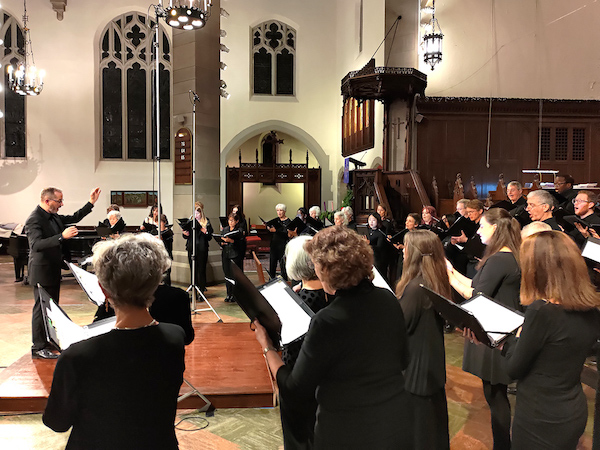Boston Cecilia serves up a wide-ranging Bach feast
Sunday’s unseasonably warm, soggy forecast certainly wasn’t one to encourage the Christmas spirit. But inside Brookline’s All Saints Parish, Boston Cecilia did their best to dispel the day’s gloomy aspect.
Led by conductor Michael Barrett and accompanied by organist Kevin Neel, the afternoon’s program, “Bach Illuminated,” was centered on the iconic German composer: music he wrote, composers he influenced, and predecessors that influenced him. Heard via stream and even from a distance, the concert added up to a substantial, mostly festive musical offering.
The afternoon’s largest number was J. S. Bach’s motet Jesu, meine Freude. Though its text makes no mention of either Advent or Christmas, the work has, since the composer’s day, been associated with these seasons.
Sunday’s reading was warmly sung, the choir bringing strong dynamic contrasts to its eleven movements, especially the opening “Jesu, meine Freude” and the gently rolling “Ihr aber seid nicht Fleischlich.”
Most impressive were its three trios: “Denn das Gesetz,” “So aber Christus,” and “Gute Nacht, o Wesen.” Each was delivered with pure-toned focus by soloists drawn from Cecilia’s ranks (Marylène Altieri, Jamie Chelel, Grace Coberly, Charlie Evett, Deborah Greenman, Deborah Grose, Benjamin Petty, Connor Vigeant, and Megan Weireter).
The afternoon’s account of Johann Sebastian’s Vom Himmel hoch was likewise clear and secure, as were a pair of pieces by the great man’s older cousins, Johann Michael and Johann Christoph (who also had the distinction of being J. S.’s first father-in-law). Barrett’s account of the former’s Halt was du hast was conspicuously well-enunciated and -phrased, while the melismas in the latter’s Lieber Herr Gott flowed gracefully.
Similar figurations in Jan Pieterszoon Sweelinck’s Hodie Christus natus est, however, weren’t quite as refined and the “Gloria” from Dietrich Buxtehude’s Missa brevis would have benefited from bolder dynamic shaping. Regardless, Giovanni Palestrina’s O magnum mysterium was well-blended and several of the selections highlighting Bach’s enduring influence were striking.
Chief among those was Fanny Hensel’s Gebet in der Christnacht, a prayerful hymn heard on Sunday in Olivia Sparkhall’s choral arrangement. A simple, lovely work, the score unfolded in shapely waves of sound.
Similarly memorable were a pair of motets by Hensel’s brother, Felix Mendelssohn. His Weinachten and Im Advent brought the afternoon a welcome dose of brightness and energy. Cecilia dispatched both works with good diction and strong rhythmic presence.
Johannes Brahms’ Es ist das Heil offered a mix of serenity and vigor, Barrett drawing singing of limber athleticism over its fugal second part. The same quality marked both the lively middle section of Zanaida Robles’ Ecstatic Expectancy and its outer solos, the latter invigoratingly sung by Lessie Tyson and Deborah Grose.
Meanwhile, the pungent dissonances of Knut Nystedt’s Immortal Bach functioned as a kind of late-afternoon wakeup call and set up a strong contrast with Adolphus Hailstork’s nobly lyrical A Christmas Canticle.
To close the afternoon, Barrett and Company offered an encore of one more piece by Johann Sebastian: a fittingly sweet account of “O Jesulein süss,” featuring Bach devotee Max Reger’s harmonization of the tune discreetly interpolated into the second verse.
Boston Cecilia performs music by Lili Boulanger, Claude Debussy, Francis Poulenc, Maurice Ravel, Camille Saint-Saëns, Sydney Guillaume, Lionel Dauner, and more 8 p.m. March 16 at All Saints Parish. bostoncecilia.org
Posted in Performances
